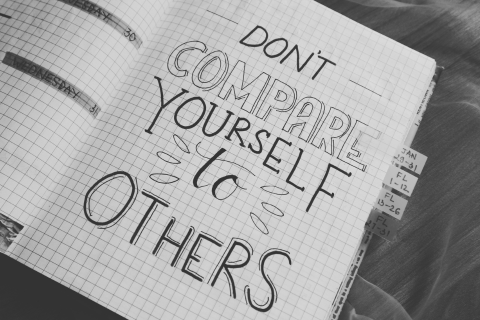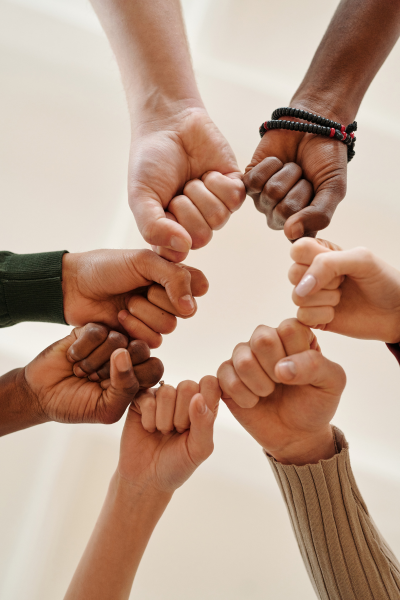We often think of comparison as competition, but it’s possible to think of comparison as connection.
 We are wired to compare ourselves to others and to different versions of ourselves. The social comparison theory explains our tendency to compare ourselves to others. Comparing ourselves to people we view as better than us is called upward comparison, while comparing ourselves to people we see as worse than us is called downward comparison.
We are wired to compare ourselves to others and to different versions of ourselves. The social comparison theory explains our tendency to compare ourselves to others. Comparing ourselves to people we view as better than us is called upward comparison, while comparing ourselves to people we see as worse than us is called downward comparison.
With the rise of social media, we have a limitless number of options to compare ourselves with other people! That can be a big problem. For example, researchers in 2014 determined that more social media use, especially on Facebook, is correlated with lower self-esteem. The impact of upward social comparisons, looking at others and thinking they are happier or healthier than we are, was related to lower self-esteem and self-evaluations. But comparisons are not always a bad thing; they can actually help us sometimes! When we do compare ourselves to others, how might we do it in a way that is constructive and conducive to growth? 
We can build on our immediate reflex to compare ourselves to others in order to find more connection and support with those going through similar experiences. Sometimes, people have it worse than we do, and sometimes it can help us to have some perspective about the issues we deal with in our own lives. It can help us be grateful for what we have. If we are connected with those who might be struggling more than we are, we can offer them kindness and support. This is one way of cultivating comparison as a source of connection.
Upward comparisons, comparing yourself to someone you view as “better” than you, can sometimes be inspirational and even help you improve in areas of your life where you want to improve. However, upward comparison also has the potential to negatively influence your own self-esteem if you compare yourself to something that is completely unattainable. When you find yourself comparing yourself to others on social media and feeling bad, try asking yourself, “Do I feel inspired?” If not, perhaps it’s best to stop looking at that post and instead seek out more appropriate role models who do inspire you. Social media is full of inspiring people. What can you learn from their journeys?
 When you look at many of the inspirational stories either in popular media or in your own life, it’s easy to focus on the outcome. You often don’t see all the hard work and diligence that went into making that outcome happen. For example, I was recently reflecting on the Winter Olympics and how these exceptional athletes cope with failure on their paths to success. When we watch something like the Olympics, it’s easy to focus only on the many successes athletes have and lose sight of the obstacles they faced along the way. It would be unrealistic for a snowboarder to perfect a new stunt in the course of a week (or even a year). Even athletes like Chloe Kim have experienced falls and disappointments. When you compare yourself to others, try not to focus on what they achieved. Instead focus on what you can learn about how they reached their goals. I love how Chloe was able to acknowledge the different conditions that contributed to not landing the stunts as she’d hoped. She used that as a learning experience and eventually came back to win gold after giving herself permission to take a mental break. When you compare yourself to others, look at how they’ve built up their progress slowly. Ask yourself how you might do some of the things that they did in your own life. Perhaps they used visualization techniques or focused on improving their nutrition. What strategies did they use that you might want to try? Shift your focus from their outcome to their process. Focusing on small steps can help you maintain motivation and work towards your bigger goals. Celebrating progress and learning to embrace imperfections is a huge step. It’s much more constructive than getting discouraged and labeling your setbacks as unconstructive failures.
When you look at many of the inspirational stories either in popular media or in your own life, it’s easy to focus on the outcome. You often don’t see all the hard work and diligence that went into making that outcome happen. For example, I was recently reflecting on the Winter Olympics and how these exceptional athletes cope with failure on their paths to success. When we watch something like the Olympics, it’s easy to focus only on the many successes athletes have and lose sight of the obstacles they faced along the way. It would be unrealistic for a snowboarder to perfect a new stunt in the course of a week (or even a year). Even athletes like Chloe Kim have experienced falls and disappointments. When you compare yourself to others, try not to focus on what they achieved. Instead focus on what you can learn about how they reached their goals. I love how Chloe was able to acknowledge the different conditions that contributed to not landing the stunts as she’d hoped. She used that as a learning experience and eventually came back to win gold after giving herself permission to take a mental break. When you compare yourself to others, look at how they’ve built up their progress slowly. Ask yourself how you might do some of the things that they did in your own life. Perhaps they used visualization techniques or focused on improving their nutrition. What strategies did they use that you might want to try? Shift your focus from their outcome to their process. Focusing on small steps can help you maintain motivation and work towards your bigger goals. Celebrating progress and learning to embrace imperfections is a huge step. It’s much more constructive than getting discouraged and labeling your setbacks as unconstructive failures.
Comparing yourself with others in a healthy and growth-producing way can help you to focus on the steps you need to take towards your own goals. It can also help you feel less alone as you strive toward your goals with a sense of determination. I’m passionate about supporting, uplifting, and encouraging women on their journey to be the best versions of themselves. If you are interested in learning more, please don’t hesitate to reach out to me!
Contributor Statement: Olivia Knizek (oliviaknizek@my.unt.edu) contributed to the research and writing of this blog. Olivia is a PhD student in counseling psychology interested in athlete mental health, performing artists, and resiliency from trauma.
